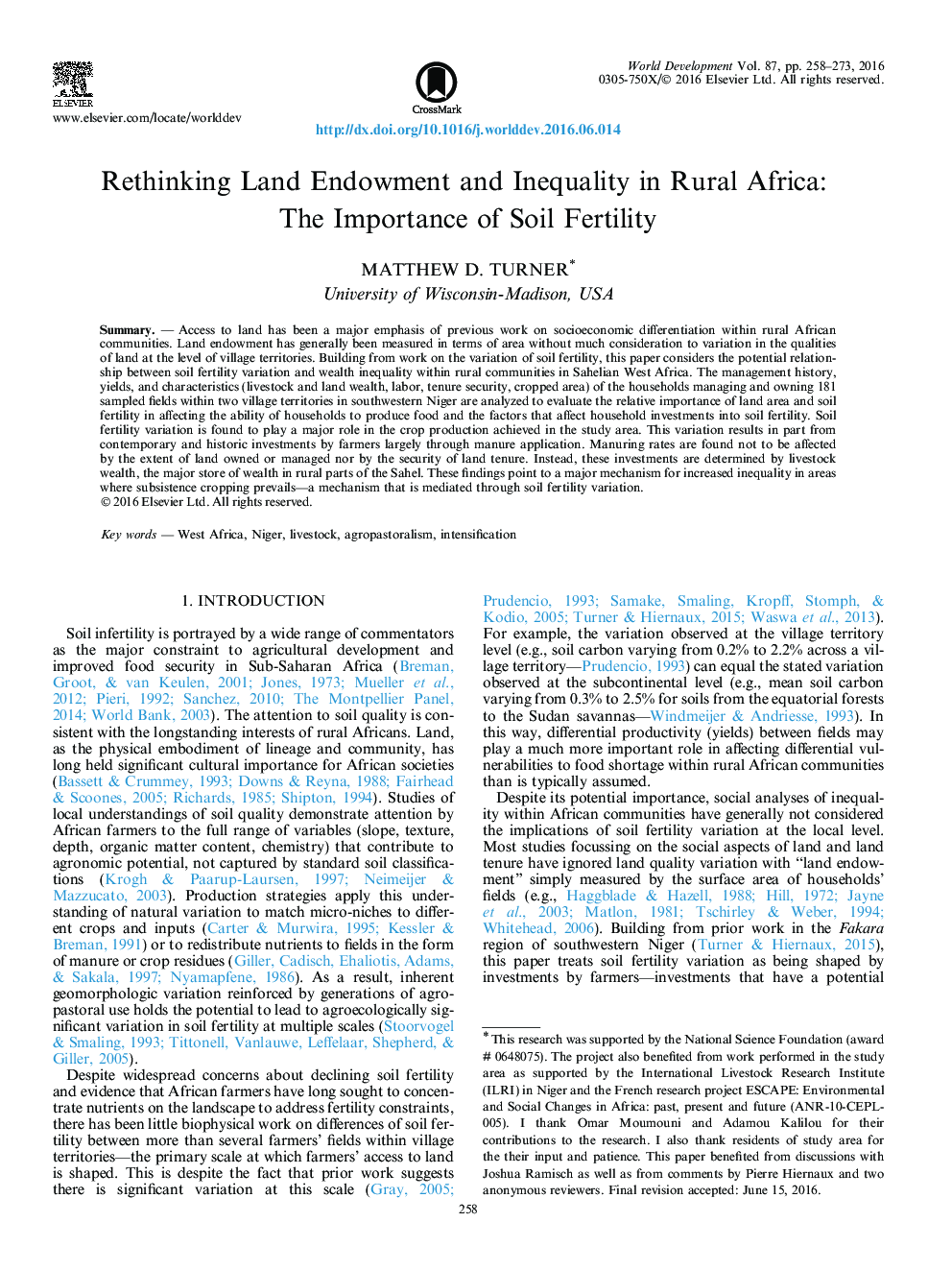| کد مقاله | کد نشریه | سال انتشار | مقاله انگلیسی | نسخه تمام متن |
|---|---|---|---|---|
| 7392492 | 1481131 | 2016 | 16 صفحه PDF | دانلود رایگان |
عنوان انگلیسی مقاله ISI
Rethinking Land Endowment and Inequality in Rural Africa: The Importance of Soil Fertility
ترجمه فارسی عنوان
سرمایه گذاری زمین و نابرابری در آفریقای روستایی: اهمیت باروری خاک
دانلود مقاله + سفارش ترجمه
دانلود مقاله ISI انگلیسی
رایگان برای ایرانیان
کلمات کلیدی
غرب آفریقا، نیجر، دام کشت و زرع تشدید
ترجمه چکیده
دسترسی به زمین تاکید زیادی بر کار قبلی در تمایز اجتماعی و اقتصادی در جوامع روستایی آفریقایی شده است. تقدیر از زمین به طور کلی از لحاظ منطقه مورد سنجش قرار گرفته است و بدون در نظر گرفتن تغییرات در کیفیت زمین در سطح سرزمین های روستایی مورد سنجش قرار نگرفته است. در این مقاله با استفاده از کار بر روی تنوع باروری خاک، رابطه پتانسیل تنوع باروری خاک و نابرابری ثروت در جوامع روستایی در غرب آفریقا ساحل مورد بررسی قرار گرفته است. تاریخچه مدیریت، ارقام و خصوصیات (دامداری و ثروت زمین، نیروی کار، امنیت حراست، منطقه برداشت شده) خانوارهایی که 181 مزرعه نمونه را در دو سرزمین روستایی در جنوب غربی نیجر مدیریت و مالکیت می کنند، برای ارزیابی اهمیت نسبی خاک و خاک باروری در تأثیر بر توانایی خانوارها برای تولید غذا و عوامل موثر بر سرمایه گذاری خانوار در باروری خاک. تغییرات باروری خاک نقش عمده ای در تولید محصول به دست آمده در منطقه مطالعه ایفا می کند. این تنوع بخشی از سرمایه گذاری های معاصر و تاریخی کشاورزان است که عمدتا از طریق کاربرد کود می باشد. میزان تخمیر ناشی از میزان مالکیت زمین یا مدیریت شده و یا امنیت حراست از زمین نیست. در عوض، این سرمایه گذاری ها توسط ثروت دام ها، فروشگاه بزرگ ثروت در مناطق روستایی ساحل تعیین می شود. این یافته ها نشان می دهد که یک مکانیزم مهمی برای افزایش نابرابری در مناطقی است که در آن برآورده شدن معیشت، یک مکانیزم است که از طریق تنوع باروری خاک مداخله می کند.
موضوعات مرتبط
علوم انسانی و اجتماعی
اقتصاد، اقتصادسنجی و امور مالی
اقتصاد و اقتصادسنجی
چکیده انگلیسی
Access to land has been a major emphasis of previous work on socioeconomic differentiation within rural African communities. Land endowment has generally been measured in terms of area without much consideration to variation in the qualities of land at the level of village territories. Building from work on the variation of soil fertility, this paper considers the potential relationship between soil fertility variation and wealth inequality within rural communities in Sahelian West Africa. The management history, yields, and characteristics (livestock and land wealth, labor, tenure security, cropped area) of the households managing and owning 181 sampled fields within two village territories in southwestern Niger are analyzed to evaluate the relative importance of land area and soil fertility in affecting the ability of households to produce food and the factors that affect household investments into soil fertility. Soil fertility variation is found to play a major role in the crop production achieved in the study area. This variation results in part from contemporary and historic investments by farmers largely through manure application. Manuring rates are found not to be affected by the extent of land owned or managed nor by the security of land tenure. Instead, these investments are determined by livestock wealth, the major store of wealth in rural parts of the Sahel. These findings point to a major mechanism for increased inequality in areas where subsistence cropping prevails-a mechanism that is mediated through soil fertility variation.
ناشر
Database: Elsevier - ScienceDirect (ساینس دایرکت)
Journal: World Development - Volume 87, November 2016, Pages 258-273
Journal: World Development - Volume 87, November 2016, Pages 258-273
نویسندگان
Matthew D. Turner,
